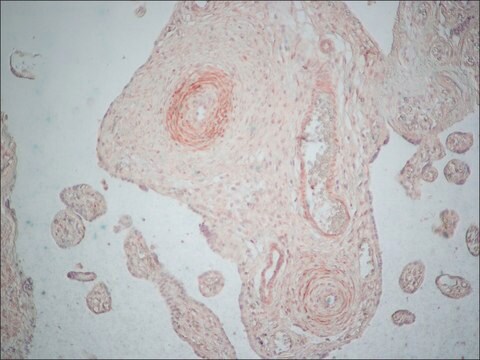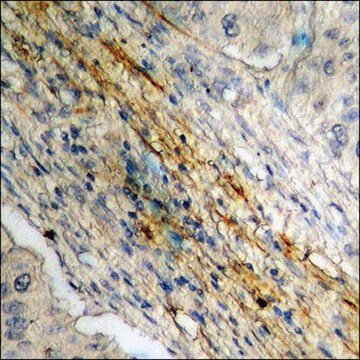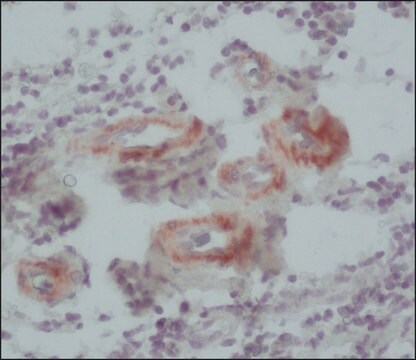MAB3576
Anti-Caldesmon Antibody, smooth muscle, clone N5/22
clone N5/22, Chemicon®, from mouse
About This Item
Recommended Products
biological source
mouse
Quality Level
antibody form
purified antibody
antibody product type
primary antibodies
clone
N5/22, monoclonal
species reactivity
rabbit, bovine, human, pig
manufacturer/tradename
Chemicon®
technique(s)
immunocytochemistry: suitable
immunohistochemistry: suitable (paraffin)
immunoprecipitation (IP): suitable
western blot: suitable
isotype
IgG1
NCBI accession no.
UniProt accession no.
shipped in
wet ice
target post-translational modification
unmodified
Gene Information
human ... CALD1(800)
General description
is also localized in the stress fibers of fibroblasts. Caldesmon was identified as a
Ca2+/Calmodulin-binding protein with molecular weight of 120-150kDa (H-Caldesmon)
and 70-80kDa (L-Caldesmon). H-Caldesmon is the primary isoform in smooth muscle
while L-Caldesmon is most abundant in non-muscle cells. Caldesmon is capable of
binding two calmodulin molecules, one at either end of the protein. Additionally,
Caldesmon is an actin, myosin, and tropomyosin-binding protein. Human L-Caldesmon
is a protein of 538 amino acids with mobility of 80kDa. In vitro, L-Caldesmon inhibits
the actomyosin ATPase in an F-Actin-dependent manner. L-Caldesmon may play an
important function in motile processes such as secretion and organelle movement.
Specificity
Immunogen
Application
Metabolism
Muscle Physiology
Immunohistochemistry on frozen and paraffin embedded tissue sections. Suggested fixation for frozen tissue sections is acetone fix for 6 minutes at room temperature. For formalin fixed paraffin embedded tissue sections: microwave in 0.01M citrate buffer (pH 6.0) for 8-10 minutes (note that all microwaves differ and adjustments may need to be made) follow with enzyme digestion (0.01% pronase for 10 mintues). Suggested blocking agent is fetal bovine serum. The antibody has also been used successfully on methyl-Carnoy fixed tissue.
Immunocytochemistry
Immunoprecipitation. Suggested extraction buffer is 20 mM Tris-HCl, pH 7.4, 150 mM NaCl, 1% Triton X-100, 0.1% SDS, 0.5% deoxycholic acid-NaCl and 0.5 mM PMSF. Final reaction volume is 1 mL and suggested capture agent is agarose conjugated anti-mouse IgG.
Optimal working dilutions must be determined by the end user.
Linkage
Physical form
Storage and Stability
Analysis Note
POSITIVE CONTROL:
Smooth muscle (e.g. aterial tunica media). Negative control: any nonmuscle tissue (e.g. arterial tunica adentitial).
Other Notes
Legal Information
Disclaimer
Not finding the right product?
Try our Product Selector Tool.
Storage Class Code
12 - Non Combustible Liquids
WGK
WGK 2
Flash Point(F)
Not applicable
Flash Point(C)
Not applicable
Certificates of Analysis (COA)
Search for Certificates of Analysis (COA) by entering the products Lot/Batch Number. Lot and Batch Numbers can be found on a product’s label following the words ‘Lot’ or ‘Batch’.
Already Own This Product?
Find documentation for the products that you have recently purchased in the Document Library.
Our team of scientists has experience in all areas of research including Life Science, Material Science, Chemical Synthesis, Chromatography, Analytical and many others.
Contact Technical Service







